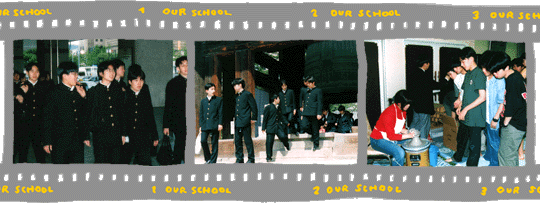|
|||
| In May ninth graders
go with their teachers on a three-day, two-night trip to Kyoto
and Nara,
two ancient cities where emperors used to live. Nara was the capital of
Japan for most of the eighth century, and Kyoto was the capital for over
a thousand years, starting at the end of the eighth century. The purpose
of the class trip is to allow students to make firsthand observations
of old temples and ruins as well as traditional crafts like ceramics and
dyed articles. Through this group activity, students also learn how to
behave in a manner that fosters harmony and facilitates teamwork.
The trip from Tokyo to Kyoto takes about two and a half hours by Shinkansen (bullet train). When they arrive in Kyoto, the students tour the city by bus. Among the highlights of the tour are visits to Kinkaku-ji, a gilded temple built in the fourteenth century; and Ginkaku-ji, a famous fifteenth-century Zen temple. The students also learn how Kiyomizu ware, the ceramics produced in and around Kyoto, is made. The students get a chance to paint pictures on teacups, which are then fired in a kiln. The students get their teacups a month later in the mail. The teacups are displayed at the school fair the following fall.
|
|||
 |
|||
| |||
| On the second day of their class trip, the students travel by bus from Kyoto to Nara. There, they visit Horyu-ji, a temple with the world's oldest wooden building. Though the students have seen pictures of this temple in their textbooks, most of them have never actually visited it before. Seeing the real thing is a powerful experience for everyone. After spending the day in Nara, the students return to Kyoto by bus. |







